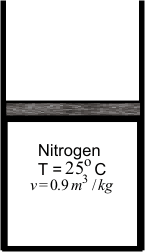The State Postulate
As noted earlier, the state of a system is described by its properties. But we know from experience that we do not need to specify all the properties in order to fix a state. Once a sufficient number of properties are specified, the rest of the properties assume certain values automatically. The number of properties required to fix the state of a system is given by the state postulate:
The state of a simple compressible system is completely specified by two independent properties.
A system is called a simple compressible system in the absence of electrical, magnetic, gravitational, motion, and surface tension effects. These effects are due to external force fields and are negligible for most engineering problems. Otherwise, an additional property needs to be specified for each effect which is significant. If the gravitational effects are to be considered, for example, the elevation z needs to be specified in addition to the two properties necessary to fix the state.
The state postulate is also known as the two-property rule.
The state postulate requires that the two properties specified be independent to fix the state. Two properties are independent if one property can be varied while the other one is held constant. Temperature and specific volume, for example, are always independent properties, and together they can fix the state of a simple compressible system (Fig. 5.1).

Figure 5.1
For a simple compressible substance (gas), we need the following properties to fix the state of a system:
ρ or PT or
or PT or  T or uP or u T or uP or u . Why not u and T? They are closely related. For ideal gas u=u(t) . Why not u and T? They are closely related. For ideal gas u=u(t)
Temperature and pressure are dependent properties for multi-phase systems. At sea level ( P = 1 atm), water boils at 100oC, but on a mountain-top where the pressure is lower, water boils at a lower temperature. That is, T = f (P) during a phase-change process, thus temperature and pressure are not sufficient to fix the state of a two-phase system. Therefore, by specifying any two properties we can specify all other state properties. Let us choose P and 
Then
T = T(P, ) ) |
|
u = u(P, ) etc. ) etc. |
|
Can we say W = W(p, ) )
No. Work is not a state property, nor is the heat added (Q) to the system.
|